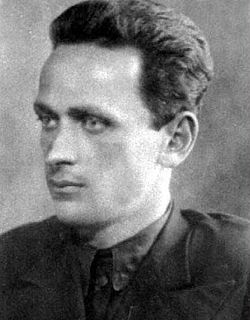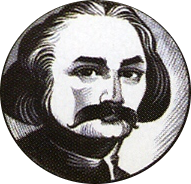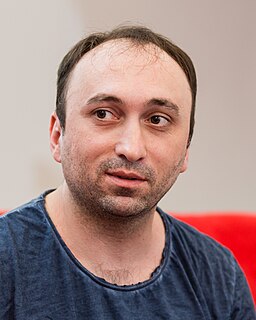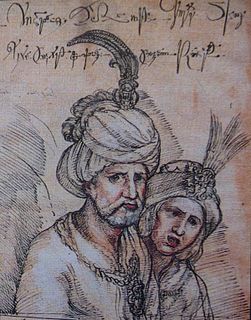 W
WAlexander Abasheli was a penname of Isaac Chochia, a Georgian poet and prose writer.
 W
WArchil, of Bagrationi dynasty, king of Imereti in western Georgia and of Kakheti in eastern Georgia (1664–75). After a series of unsuccessful attempts to establish himself on the throne of Imereti, Archil retired to Russia where he spearheaded the cultural life of a local Georgian community. He was also a lyric poet.
 W
WVladimir (Lado) Asatiani was a Georgian poet. His poetic career, lasting only for seven years, made him one of the best-loved Georgian poets of the 20th century.
 W
WPrince Nikoloz "Tato" Baratashvili was a Georgian poet. He was one of the first Georgians to marry modern nationalism with European Romanticism and to introduce "Europeanism" into Georgian literature. Due to his early death, Baratashvili left a relatively small literary heritage of fewer than forty short lyrics, one extended poem, and a few private letters, but he is nevertheless considered to be the high point of Georgian Romanticism. He was referred to as the "Georgian Byron".
 W
WBesarion Zakarias dze Gabashvili, commonly known by his pen name Besiki, was a Georgian poet, politician and diplomat, known as an author of exquisite love songs and heroic odes as well as for his political and amorous adventures.
 W
WPrince Ilia Chavchavadze was a Georgian writer, political figure, poet, and publisher who spearheaded the revival of the Georgian national movement in the second half of the 19th century, during the Russian rule of Georgia. He is Georgia's "most universally revered hero."
 W
WPrince Alexander Chavchavadze was a Georgian poet, public benefactor and military figure. Regarded as the "father of Georgian romanticism", he was a pre-eminent Georgian aristocrat and a talented general in the Imperial Russian service.
 W
WSimon Chikovani was a Georgian poet who set out to be the leader of Georgian Futurist movement and ended up as a Soviet establishment figure.
 W
WOtar Chiladze was a Georgian writer who played a prominent role in the resurrection of Georgian prose in the post-Joseph Stalin era. His novels characteristically fuse Sumerian and Hellenic mythology with the predicaments of a modern Georgian intellectual.
 W
WTamaz Chiladze was a Georgian writer, dramatist and poet. He was the elder brother of Georgian writer Otar Chiladze.
 W
WNodar Dumbadze was a popular Georgian writer.
 W
WPrince Raphael Eristavi (1824-1901) was a Georgian poet and playwright.
 W
WKonstantine Gamsakhurdia was a Georgian writer and public figure. Educated and first published in Germany, he married Western European influences to purely Georgian thematic to produce his best works, such as The Right Hand of the Grand Master and David the Builder. Hostile to the Soviet rule, he was, nevertheless, one of the few leading Georgian writers to have survived the Stalin-era repressions, including his exile to a White Sea island and several arrests. His works are noted for their character portrayals of great psychological insight. Another major feature of Gamsakhurdia's writings is a new subtlety he infused into Georgian diction, imitating an archaic language to create a sense of classicism.
 W
WValerian Gaprindashvili was a Georgian poet and translator whose early, Symbolist, poetry was of much influence on development of Georgian metaphor and verse.
 W
WMirza Gelovani was a Georgian poet who died, fighting in the Soviet ranks during World War II at the age of 27.
 W
WTerenti Kvirkvelia, well known with his pen-name Terenti Graneli (1897–1934) was a noted Georgian poet. Born in Tsalenjikha, he was raised in a family of poor peasants. After graduating primary school in his native village in 1918 he continued studying at the short courses organized by Shalva Nutsubidze in Tbilisi. He had several jobs including a worker at the railway station, and clerk at the newspaper. Graneli published his first verses in 1918. His collection of poems "Memento mori" appeared in 1924. From the beginning of 1928 Graneli's health worsened and he died in 1934.
 W
WGrigol was a Georgian royal prince (batonishvili) of the house of Bagrationi. A grandson of George XII, the last king of Georgia, and the only son of Prince Ioane of Georgia, he was briefly proclaimed as King of Georgia during a revolt against the Russian rule in 1812. After spending several months in a Russian prison, Grigol joined the Russian military ranks and took part in the 1813 Polish campaign. He is the author of several poems, memoirs, and a compilation of Georgian poetry.
 W
WIoseb Grishashvili was a pen name of Ioseb Mamulishvili was a noted poet and historian from Georgia. A history museum in Tbilisi, his birth- and death place is named for him.
 W
WPrince Davit Guramishvili was a Georgian poet who wrote the finest pieces of pre-Romantic Georgian literature. His poetic talents thrived far from his motherland, being forced by personal misfortunes and turmoil in Georgia to spend several years in the Russian military service until his retirement to his small Ukrainian estate at Myrhorod where he made eighty-seven years of his tragic and turbulent life into one cycle of autobiographical poetry, the Davitiani, which he sent to Georgia through a Georgian embassy returning from the Russian empire in 1787.
 W
WIetim Gurji was a Georgian poet. He wrote in Georgian, Armenian and Azeri languages. His poetry mainly was distributed orally, by songs, which he created and performed himself. Main motifs of his poetry were the lives of late 19th and early 20th century Old Tbilisi bohemians, along with workers, peasants and petite bourgeoisie.
 W
WPaolo Iashvili was a Georgian poet and one of the leaders of Georgian symbolist movement. Under the Soviet Union, his obligatory conformism and the loss of his friends at the height of Joseph Stalin’s Great Purge heavily affected Iashvili, who committed suicide at the Writers’ Union of Georgia.
 W
WJohn Zosimus, also known as Ioane-Zosime was the 10th-century Georgian Christian monk, religious writer, and calligrapher known for his liturgical compilations and the hymns dedicated to the Georgian language.
 W
WGiorgi Kekelidze is a Georgian poet, essayist and the founder of the first Georgian digital library, lib.ge.
 W
WZaza Koshkadze was born in 1982 and graduated from the Institute of Traditional and Contemporary Art in Tbilisi, majoring in Georgian folk music. With his fellow young poets he co-founded the Net Of Alternative Poetry, and later the Pink Bus. He translated Charles Bukowski, Allen Ginsberg, Chuck Palahniuk, Rog Phillips, Stephen King, Richard Laymon and other contemporary writers. His short story Me, My Grandma, Grand Grandma and Aliens was included in the anthology 15 Best Georgian Stories in 2012. Koshkadze's poems have been translated into six languages.
 W
WMerab Kostava was a Georgian dissident, musician and poet; one of the leaders of the National-Liberation movement in Georgia. Along with Zviad Gamsakhurdia, he led the dissident movement in Georgia against the Soviet Union, until his death in a car accident in 1989.
 W
WGiorgi Leonidze was a Georgian poet, prose writer, and literary scholar.
 W
WMirian was a Georgian prince (batonishvili) of the Bagrationi dynasty, born to King Heraclius II and Queen Darejan Dadiani. After Heraclius placed his kingdom under the Russian protectorate in 1783, Mirian entered the Russian army, attaining to the rank of major general. He reconciled with the Russian annexation of Georgia in 1801, departing to St. Petersburg, where he ended his days as a senator of the Empire. Of some literary talent, Mirian translated from Russian and himself composed poetry.
 W
WNiko Nikoladze was a notable Georgian writer, pro-Western enlightener, and public figure primarily known for his contributions to the development of Georgian liberal journalism and his involvement in various economic and social projects of that time.
 W
WCount Alexander Orbeliani (Jambakur-Orbeliani) was a Georgian Romanticist poet, playwright, journalist and historian, of the noble House of Orbeliani.
 W
WPrince Grigol Orbeliani or Jambakur-Orbeliani was a Georgian Romanticist poet and general in Imperial Russian service. One of the most colorful figures in the 19th-century Georgian culture, Orbeliani is noted for his patriotic poetry, lamenting Georgia's lost past and independent monarchy. At the same time, he spent decades in the Russian military service, rising through ranks to highest positions in the imperial administration in the Caucasus.
 W
WPrince Vakhtang Orbeliani was a Georgian Romanticist poet and soldier in the Imperial Russian service, of the noble House of Orbeliani.
 W
WParnaoz was a Georgian prince (batonishvili) of the Bagrationi dynasty, the 14th son of Heraclius II, the penultimate king of Kartli and Kakheti, by his third marriage to Queen Darejan Dadiani. Parnaoz tried to challenge the recently established Imperial Russian rule in Georgia and in 1804 headed an unsuccessful insurrection of the Georgian mountaineers in the course of which he was arrested and deported to Russia. Afterwards, he spent most of his life in St. Petersburg, becoming the first Georgian translator of the 18th-century French philosopher Jean-Jacques Rousseau.
 W
WShota Rustaveli, mononymously known simply as Rustaveli, was a medieval Georgian poet. He is considered to be the pre-eminent poet of the Georgian Golden Age and one of the greatest contributors to Georgian literature. Rustaveli was the author of The Knight in the Panther's Skin, which is considered to be a Georgian national epic poem.
 W
WPaata Shamugia – the most influential and provocative contemporary Georgian poet. His texts, according to Georgian literary scholars, comprise a high amount of self-irony and sometimes, even weird linguistic performances as well. In 2015 year he became the first Georgian poet to get the most prestigious SABA literary prize twice.
 W
WBagrat Uasyl-ipa Shinkuba was an Abkhaz writer, poet, historian, linguist and politician. He studied history and languages of Abkhaz, Adyghe and Ubykh people. His novel The Last of the Departed is dedicated to the tragic destiny of Ubykh nation, which became extinct along a hundred of years.
 W
WJoseph Vissarionovich Stalin was a Georgian revolutionary and Soviet politician who ruled the Soviet Union from the mid-1920s until his death in 1953. During his years in power, he served as both General Secretary of the Communist Party of the Soviet Union (1922–1952) and Chairman of the Council of Ministers of the Soviet Union (1941–1953). Despite initially governing the country as part of a collective leadership, he ultimately consolidated power to become the Soviet Union's de facto dictator by the 1930s. A communist ideologically committed to the Leninist interpretation of Marxism, Stalin formalised these ideas as Marxism–Leninism, while his own policies are known as Stalinism.
 W
WGalaktion Tabidze, simply referred to as Galaktioni, was a Georgian poet of the twentieth century whose writings profoundly influenced all subsequent generations of Georgian poets. He survived Joseph Stalin's Great Purge of the 1930s, which claimed lives of many of his fellow writers, friends and relatives, but came under heavy pressure from the Soviet authorities. Those years plunged him into depression and alcoholism. He was placed in a psychiatric hospital in Tbilisi, where he committed suicide.
 W
WTitsian Tabidze, was a Georgian poet and one of the leaders of Georgian symbolist movement. He fell victim to Joseph Stalin's Great Purge, was arrested and executed on trumped-up charges of treason. Tabidze was a close friend of the well-known Russian writer Boris Pasternak who translated his poetry into Russian.
 W
WMamuka Tavakalashvili or Tavakarashvili was a Georgian poet, painter and famous calligrapher of the 17th century at the court of the King of Imereti.
 W
WTeimuraz I (1589–1661), of the Bagrationi Dynasty, was a Georgian monarch who ruled, with intermissions, as King of Kakheti from 1605 to 1648 and also of Kartli from 1625 to 1633. The eldest son of David I and Ketevan, Teimuraz spent most of his childhood at the court of Shah of Iran, where he came to be known as Tahmuras Khan. He was made king of Kakheti following a revolt against his reigning uncle, Constantine I, in 1605. From 1614 on, he waged a five-decade long struggle against the Safavid Iranian domination of Georgia in the course of which he lost several members of his family and ended up his life as the shah's prisoner at Astarabad at the age of 74.
 W
WTeimuraz II (1680/1700–1762) of the Bagrationi dynasty, was a king of Kakheti, eastern Georgia, from 1732 to 1744, then of Kartli from 1744 until his death. Teimuraz was also a lyric poet.
 W
WPrince Akaki Tsereteli (1840–1915), often mononymously known as Akaki, was a prominent Georgian poet and national liberation movement figure.
 W
WVakhtang VI, also known as Vakhtang the Scholar, Vakhtang the Lawgiver and Ḥosaynqolī Khan, was a Georgian monarch of the royal Bagrationi dynasty. He ruled the East Georgian Kingdom of Kartli as a vassal of Safavid Persia from 1716 to 1724. One of the most important and extraordinary statesman of early 18th-century Georgia, he is known as a notable legislator, scholar, critic, translator and poet. His reign was eventually terminated by the Ottoman invasion following the disintegration of Safavid Persia, which forced Vakhtang into exile in the Russian Empire. Vakhtang was unable to get the tsar's support for his kingdom and instead had to permanently stay with his northern neighbors for his own safety. On his way to a diplomatic mission sanctioned by Empress Anna, he fell ill and died in southern Russia in 1737, never reaching Georgia.
 W
WVazha-Pshavela, simply referred to as Vazha, is the pen name of the Georgian poet and writer Luka Razikashvili.